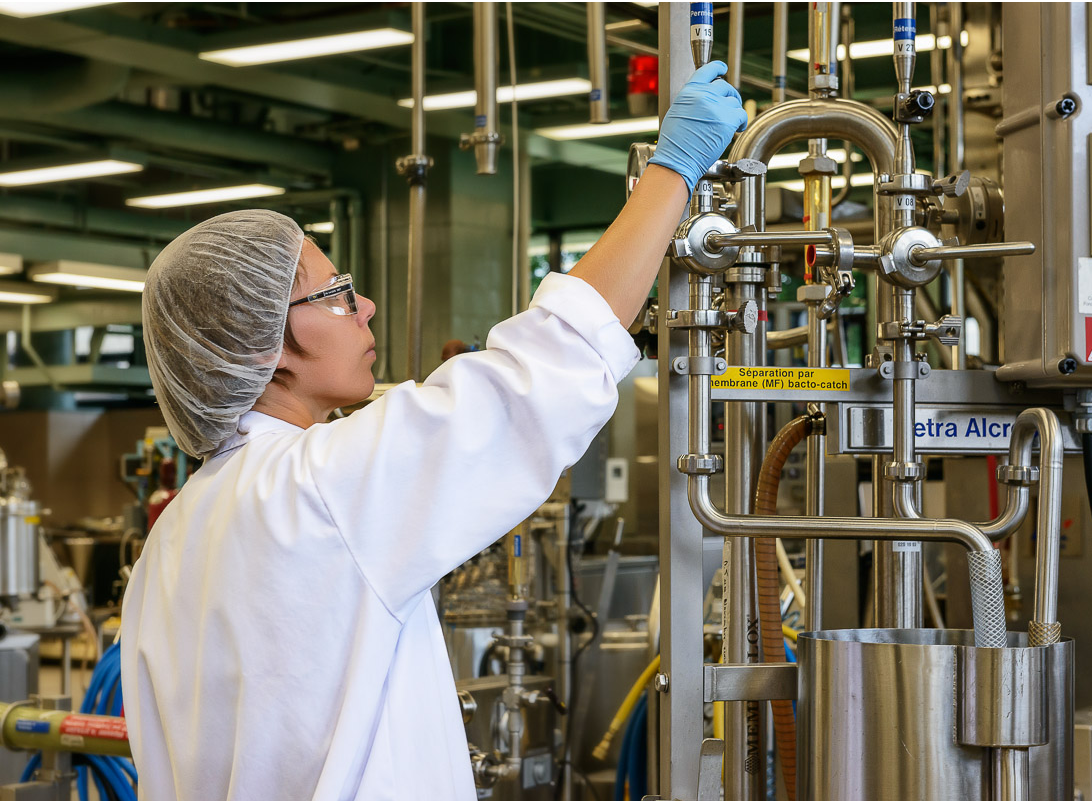Eco-Efficiency of Milk Membrane Filtration Processes

Project entitled:
NSERC-Novalait Industrial Research Chair on process efficiency in dairy technology
Yves Pouliot, Christian Bouchard, Laurent Bazinet, Alain Doyen, Steve Labrie, Michel Britten, Manuele MargnHighlights
- Membrane separation technologies have been identified as a research model due to their widespread use in the processing chain for milk and its co-products. These processes are likely to have a positive and significant effect on reductions in production costs (purchasing and replacing membranes), the use of natural resources (water, energy) and the generation of waste (sweet and acidic whey, wash water, etc.) that must be treated.
- Research conducted by the NSERC-Novalait Chair on Process Efficiency in Dairy Technology aims to optimize the use of natural dairy components while improving membrane process efficiency. These improvements will allow for the development of innovative solutions that can be applied in the short term in the dairy processing industry.
- The research focused on improving processes in terms of eco-efficiency. The experimental approach for each of the aspects of the project includes an impact evaluation as well as a characterization of the state of the system’s components, which will serve as the basis for developing hypotheses concerning potential points to be improved upon in the process.
- The Chair led to the development of a software program to simulate eco-efficiency in dairy processes, which is in the final stages of development before being adopted
by Quebec’s dairy sector.
Objectives
The research completed by the Chair aims to:
- Identify new approaches that will improve the use of milk’s natural components while minimizing the environmental impact of processes (water, energy, losses/waste).
- Develop measuring tools and the appropriate inventory methods in order to be able to quantify the effects of processes on energy efficiency parameters for dairy processing.
- Apply the new tools to problems concerning the processing of milk and its co-products.
Results and potential benefits
Economic benefits
Increased productivity: the contribution of filtration parameters on the appearance of clogging and the increased energy consumption of baromembrane systems during the fractioning of dairy components helps generate useful data that can be used as a decision-making tool for dairy processors in order to optimize their plant’s efficiency.
Reduced processing costs: the study of biofilm establishment mechanisms, their contribution to performance losses in baromembrane processes and the implementation of solutions that help control their long-term formation will help dairy producers to minimize costs related to the replacement and cleaning of membranes.
Improved quality of end products: understanding mechanisms related to modifications in the physico-chemical properties of concentrated dairy matrices helps optimize their stability and quality during storage. As a result, this increases their potential for use in cheesemaking.
Environmental benefits
All of the studies related to optimizing filtration parameters in order to control organic and microbiological clogging leads to 1) a reduction in inputs and outputs related to a reduction in energy consumption and cleaning solutions/effluents, as well as optimization of the lifespan of membranes, and allow for 2) the development of eco-efficiency simulation software adapted to dairy processes, making it possible to test different production scenarios related to economic data (cost of raw materials and resources) as well as environmental data and to choose the most energy efficient option.
Social benefits
As consumers are becoming increasingly socially responsible in their consumption habits, all of the advantages presented above will help to better meet the needs of consumers, in the long-term, from a sustainable development point of view.
Professionals trained
Outgoing researchers working under the Chair are all trained experts with a specific interest in dairy science, process efficiency and sustainable development.
- Daniel Tremblay-Marchand (MSc) – January 2016
- Stéphanie Méthot-Hains (MSc) – April 2016
- Dany Mercier-Bouchard (MSc) – December 2016
- Gabrielle Beaulieu-Carbonneau (MSc) – December 2017
- Camile Gavazzi-April (MSc) – April 2018
- Iris Dussault-Chouinard (MSc) – April 2019
- Isabelle Fournier (MSc) – November 2019
- Amandine Bouyer (MSc) – December 2019
- Virginie Damphousse (MSc) – April 2020
- Scott Benoit (PhD) – June 2018 + (postdoctoral fellow, Mitacs): 2018-2020
- Agathe Lauzin (PhD) – December 2018
- Julien Chamberland (PhD) – August 2018 + (postdoctoral fellowship, INRA): 2018-2019
Financial contributions
- National Sciences and Engineering Research Council of Canada
- Novalait
- Canadian Foundation for Innovation (Leadership funds)
- Université Laval